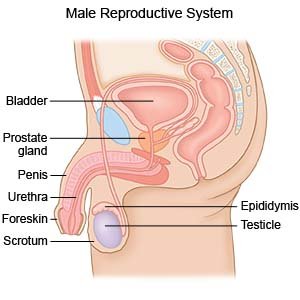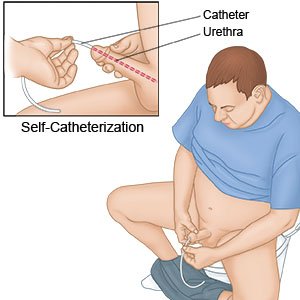Cryosurgery for Prostate Cancer
Medically reviewed by Drugs.com. Last updated on Apr 2, 2024.
AMBULATORY CARE:
What you need to know about cryosurgery:
Cryosurgery, also called cryotherapy or cryoablation, is surgery to treat prostate cancer by freezing the prostate cancer cells. The prostate is a male sex gland that helps make semen.
 |
How to prepare for cryosurgery:
Your healthcare provider will talk to you about how to prepare for surgery. You may be told not to eat or drink anything after midnight on the day of your surgery. Your provider will tell you which medicines to take or not take on the day of your surgery.
What will happen during cryosurgery:
- You may be given general anesthesia to keep you asleep and free from pain during surgery. You may instead be given local anesthesia to numb the area. You will be awake with local anesthesia, but you will not feel pain. A warming catheter will be placed in your urethra. This will help protect the urethra and rectum from the cold temperature. Your healthcare provider will put an ultrasound probe into your rectum to guide the insertion of the cryoprobes (probes or needles). Small incisions may be made in your perineum if large cryoprobes will be used. The perineum is the area between your penis and anus. Six to 30 cryoprobes will be placed into the prostate through your perineum. These cryoprobes are connected to a machine that allows your healthcare provider to control the temperature. Sensors will also be placed to monitor the temperature of the prostate and the structures around it. A cryogen (freezing liquid chemical) will be passed into the cryoprobes until it fills the prostate.
- When the cryogen is inside the prostate, your healthcare provider may set the temperature to the freezing point or lower. This forms small ice balls that freeze the cancer cells. Your healthcare provider will then allow the ice to thaw by replacing the liquid with helium. Your provider may repeat the freezing and thawing process to make sure all the cancer cells are killed. When the last thawing is completed, a catheter will be put into your bladder to help drain your urine. The cryoprobes will be removed and any incisions that were made will be closed and covered with bandages.
What will happen after cryosurgery:
The catheter placed during surgery to drain urine will stay in place for up to 3 weeks after surgery. You should expect to have some bruising and feel sore where the probes went into your body. This is normal and should not last long. You may be allowed to go home the same day as your procedure, or you may need to stay in the hospital.
Risks of cryosurgery:
- Problems may happen during your cryosurgery and your healthcare provider may need to make a larger incision. A large incision will allow your provider to fix problems with your prostate or stop the bleeding. The cold temperature may cause irritation or damage in and around the prostate. Your prostate or other parts of the urinary tract may get injured during surgery. Blood flow or nerves may be affected and cause you to have more problems urinating or having an erection. You may also have swelling, pelvic pain, or a numb feeling down your legs. Even after cryosurgery, all of the cancer cells may not be killed, or the tumor may come back. You may need to have more cryosurgeries or other procedures.
- You may get a blood clot in your leg or arm. The clot may travel to your heart or brain and cause life-threatening problems, such as a heart attack or stroke.
Call your local emergency number (911 in the US) if:
- You suddenly feel lightheaded and short of breath.
- You have chest pain when you take a deep breath or cough.
- You cough up blood.
Seek care immediately if:
- Your arm or leg feels warm, tender, and painful. It may look swollen and red.
- You cannot urinate, or if you have a catheter, no urine is filling the bag.
- You have a blocked catheter or a problem with your catheter.
- You have redness, pain, blood, or drainage where the catheter enters your penis.
- Your urine smells bad or becomes red and cloudy.
Call your doctor or surgeon if:
- You have a fever.
- You have pain that does not decrease or go away after you take your medicine.
- Your urine looks pink, or you have trouble urinating.
- You have chills, a cough, or feel weak and achy.
- You are dizzy, nauseated, or vomiting.
- You have questions or concerns about your condition or care.
Medicines:
- Prescription pain medicine may be given. Ask your healthcare provider how to take this medicine safely. Some prescription pain medicines contain acetaminophen. Do not take other medicines that contain acetaminophen without talking to your healthcare provider. Too much acetaminophen may cause liver damage. Prescription pain medicine may cause constipation. Ask your healthcare provider how to prevent or treat constipation.
- Take your medicine as directed. Contact your healthcare provider if you think your medicine is not helping or if you have side effects. Tell your provider if you are allergic to any medicine. Keep a list of the medicines, vitamins, and herbs you take. Include the amounts, and when and why you take them. Bring the list or the pill bottles to follow-up visits. Carry your medicine list with you in case of an emergency.
Do pelvic floor exercises as directed:
The exercises squeeze your pelvic floor muscles and help them become stronger. To do pelvic floor exercises, squeeze your muscles like you want to stop urinating. Hold for 3 seconds and then relax. Ask your healthcare provider when to start doing these exercises, and how often to do them.
Care for the surgery area:
When you are allowed to bathe or shower, carefully wash the area with soap and water. Dry the area and put on new, clean bandages as directed. Change your bandages when they get wet or dirty.
Bladder care:
- Drink liquids as directed. Ask how much liquid to drink each day and which liquids are best for you. Liquids will help flush your bladder and prevent infection.
- You may need to learn how to replace a catheter. A catheter is a soft rubber tube that you put into your urethra to drain your urine. Ask your healthcare provider for more information on self-catheterization and catheter care.

- Do not let your bladder become too full before you empty it. Set regular times each day to urinate. Urinate as soon as you feel the need. Try to urinate every 3 hours while you are awake. Do not drink liquids right before you go to bed. At bedtime, urinate before you lie down. This will keep you from having to get up to urinate after you go to bed.
Sexual activity:
Ask when you can start to have sex again. After cryosurgery, you may have problems such as trouble having an erection. This is called erectile dysfunction (ED). These problems may not last long and most can be helped. Talk to your healthcare provider if you have concerns about ED.
Do not smoke:
Nicotine and other chemicals in cigarettes and cigars can cause lung damage and increase your risk for new or returning cancer. Ask your healthcare provider for information if you currently smoke and need help to quit. E-cigarettes or smokeless tobacco still contain nicotine. Talk to your healthcare provider before you use these products.
Follow up with your doctor or surgeon as directed:
Ask when to return to have your wound checked, catheter taken out, or stitches removed. Ask if you need to have radiation therapy and when you need to return for the treatment. Write down your questions so you remember to ask them during your visits.
© Copyright Merative 2024 Information is for End User's use only and may not be sold, redistributed or otherwise used for commercial purposes.
The above information is an educational aid only. It is not intended as medical advice for individual conditions or treatments. Talk to your doctor, nurse or pharmacist before following any medical regimen to see if it is safe and effective for you.
Learn more about Cryosurgery for Prostate Cancer
Care guides
Further information
Always consult your healthcare provider to ensure the information displayed on this page applies to your personal circumstances.
